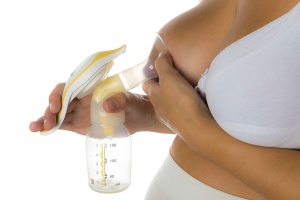In the first day or two, some babies only feed occasionally, others feed a lot more. Here’s what to expect from those first few days of breastfeeding…
Once you’ve started breastfeeding after your baby’s birth, you might think that’s it. But breastfeeding can take a few attempts and a lot of patience to get right. You and your baby will both reap many benefits if you can continue.
Here are the answers to your questions about getting into the swing of breastfeeding.
How often do babies breastfeed?
It’s normal for babies to feed at least eight times in 24 hours, often much more frequently (NHS, 2016a). You might be surprised at just how much your baby wants to feed.
Don’t worry though, this is completely normal and it doesn’t mean you’re not producing enough milk. Breastmilk is digested very quickly and easily so babies need it frequently (Bergman, 2013).
Often it is hard to tell where one feed ends and another begins. You might wonder if you’ll ever be able to get up from the sofa to make a cup of tea.
Try not to stop your baby if they want to feed as unrestricted, responsive breastfeeding is really good for your baby. They’ll generally let you know when they are hungry and stop feeding when they are satisfied (NICE, 2015; NHS, 2016b).
How do I know when my baby is full?
It’s not possible to overfeed a breastfed baby, so don’t think you’re giving your baby too much. It’s also good to remember that babies breastfeed for many other reasons than hunger, such as warmth, comfort, reassurance, love and rest (Unicef, 2018).
It’s important that your baby manages to get lots of milk in the early days, as it stimulates the production of prolactin and oxytocin. These two hormones are crucial to breastfeeding and an ample milk supply.
How do I know if my baby is getting enough breastmilk?
As you can’t see the breastmilk going into your baby’s mouth, it can be hard to know how much they’re actually drinking. So it’s important to keep an eye on your baby’s nappies.
If your baby has frequent, heavy nappies and seems satisfied after a feed, they are likely to be having plenty of milk. You’ll also want to watch out for your baby swallowing when feeding – your midwife or a skilled helper at a breastfeeding support group should be able to show you what to look for if you can’t tell.
Although it can feel like your baby is feeding a lot, a good feed might only amount to a teaspoonful of colostrum (NHS, 2016b). Colostrum is the milk that your breasts produce in the first few days after birth; it’s thick and can vary in colour (NHS, 2016). Although there might not be much colostrum, it is very concentrated and packed with vitamins and antibodies to help your baby grow and fight off infections (NHS, 2016b).
Establishing a good breastfeeding routine
After a few days, you’ll start making more mature milk rather than colostrum. This mature milk is thinner than colostrum and it’ll be more plentiful.
About two to four days after birth you might notice your breasts are warmer and feel fuller. This is known as your milk ‘coming in’ (NHS, 2016b). Your baby might want to feed for longer now, and in some cases slightly less often (NHS, 2016).
Each time your baby feeds it will send signals to your breasts to produce milk: the more your baby feeds, the more milk you will make (NHS, 2016b).
It’s good to remember how helpful skin-to-skin contact can be for helping to continue breastfeeding and for calming your baby, among other things (UNICEF, 2013; Moore et al, 2016). See more about the benefits of skin-to-skin contact in our article about breastfeeding after birth.
Is breastfeeding supposed to be painful?
It’s not uncommon to feel mild discomfort or a tugging sensation on your breast while you’re feeding in the early days. But if the pain is severe, or if there is damage to the nipple area such as bleeding, then you might need some help with positioning and attachment (NICE, 2015).
Initially, your breasts might feel full or tender but this should settle down as your milk supply adjusts to your baby’s demands. If your breasts become engorged, it is best to wear a supportive, well-fitting bra that isn’t too tight on your breasts. You should feed as often as possible or hand express a little milk for comfort. You could also massage the affected breast to prevent any blockage.
If it really hurts, you could take a painkiller compatible with breastfeeding, such as paracetamol (NICE, 2015). Talk it through with a healthcare professional to see if they can help.
If you have any questions, concerns or need support – however you're feeding your baby – you can speak to our friendly breastfeeding counsellors free of charge by calling our support line on 0300 330 0700.
What if my breasts leak?
It’s normal for some mums’ breasts to leak in the early days if they become too full. But it can also happen if your let-down reflex is stimulated when you’re in the shower or if you hear your baby cry (NHS, 2016b).
Leaking milk can be embarassing if you’re in public, so a good way to stop it wetting through your clothes is to wear breast pads. Remember to change them frequently to prevent infections like thrush. Leaking often lessens once your milk supply is established.
You can also express a little milk (not too much though as this may overstimulate your supply) so that you feel more comfortable. Or you could offer your baby a breastfeed so your breasts don’t feel too full – they won’t mind at all (NHS, 2016).
Getting used to breastfeeding
Remember that breastfeeding is a skill. It might take a few weeks for you and your baby to get used to one another and learn how to feed together.
If anything doesn’t feel right, if breastfeeding is painful or uncomfortable, or you are worried about your baby, speak to a midwife, health visitor, GP or breastfeeding counsellor (NHS, 2016a). Or call our support line on 0300 330 0700 to talk to one of trained breastfeeding counsellors.
This page was last reviewed in March 2019.
Further information
NCT supports all parents, however they feed their baby. If you have questions, concerns or need support, you can speak to a breastfeeding counsellor by calling our helpline on 0300 330 0700, whether you are exclusively breastfeeding or using formula milk. Breastfeeding counsellors have had extensive training, will listen without judging or criticising and will offer relevant information and suggestions. You can also find more useful articles here.
You might find attending one of our NCT New Baby courses helpful as they give you the opportunity to explore different approaches to important parenting issues with a qualified group leader and other new parents in your area.
Make friends with other parents-to-be and new parents in your local area for support and friendship by seeing what NCT activities are happening nearby.
Moore ER, Bergman N, Anderson G, Medley N. (2016) Early skin-to-skin contact for mothers and their healthy newborn infants. Cochrane Database of Systematic Reviews. (11):CD003519. Available at: https://www.ncbi.nlm.nih.gov/pmc/articles/PMC6464366/ [Accessed 2nd January 2018]
NICE. (2015) Postnatal care up to 8 weeks after birth: clinical guideline [CG37]. Available at:https://www.nice.org.uk/guidance/cg37/chapter/1-recommendations#infant-feeding [Accessed 2nd January 2018]
NHS. (2016a) Breastfeeding: is my baby getting enough milk? Available at: http://www.nhs.uk/Conditions/pregnancy-and-baby/Pages/breastfeeding-is-baby-getting-enough-milk.aspx [Accessed 2nd January 2018]
NHS. (2016b) Breastfeeding the first few days. Available at: http://www.nhs.uk/Conditions/pregnancy-and-baby/pages/breastfeeding-first-days.aspx?tabname=Your%20newborn [Accessed 2nd January 2018]
UNICEF. (2013) The evidence and rationale for the UK Baby Friendly Initiative Standards. Available at: https://www.unicef.org.uk/wpcontent/uploads/sites/2/2013/09/baby_friendly_evidence_rationale.pdf [Accessed 2nd January 2018]
UNICEF. (2018) Having meaningful conversations with mothers. Available at: https://www.unicef.org.uk/babyfriendly/wp-content/uploads/sites/2/2018/10/Having-meaningful-conversations-with-mothers.pdf [Accessed 2nd January 2018]







